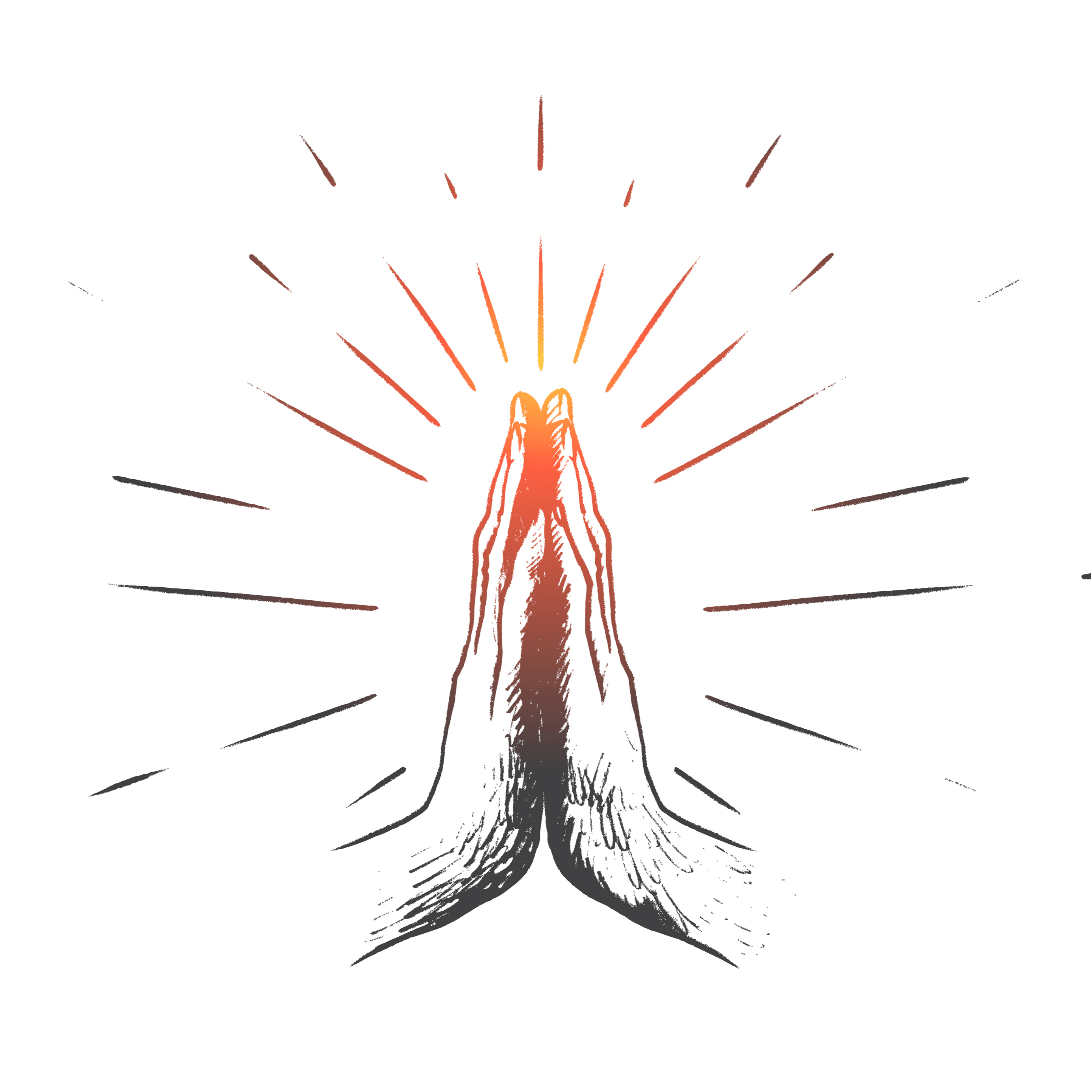Praying the Psalms
“Come, let us greatly rejoice in the Lord; let us shout aloud to God our savior; let us come before His face with thanksgiving, and let us shout aloud to Him with psalms.”
– Psalm 94 (95)
WHO ARE THE ANCHORITES?
One of the best things to come out of the pandemic this past year is the Anchorites, a group of more than 25 women who gather every morning at 9 am, Monday through Friday, to pray the Psalms for an hour via Zoom. Additionally they commemorate the saints of the day and pray for people in the parish and around the world. They’re now on their 65th round of praying the Psalter in its entirety.
On Prayer, COVID, and Fellowship
by Diane Elias

Praying the Psalms has been a practice I fell into while recuperating from surgery. One night when I couldn’t sleep because of the pain, I began reading the Psalms aloud to myself. I soon realized that the only time I was pain free was while I was reading the Psalms. This evolved into a practice I have of reading the Psalms while friends or family members are in surgery. The Wednesday evening praying of the Psalter was one of the activities that I participated in after converting to Orthodoxy.
When the pandemic hit and quarantine was immanent, St. Paul’s began scheduling things on Zoom to keep the body of Christ connected, though we were separated physically. I was feeling vulnerable and helpless but I wanted to try and help. I lit a candle (that has been burning ever since). The idea came to me that we needed to pray with intent to protect our church, our loved ones and the world from this disease and all its ramifications. We needed to stand vigil. So, I asked Father Steve and Eve Tibbs if I could pray the Psalms every morning via Zoom. No one knew if anyone would be interested. No one knew how long quarantine would last. I was given permission, and we began on March 23rd 2020, with one half hour, Monday through Friday at 9am.
The first couple of days I prayed alone. I began at 9 am and ended at 9:30 am. Then one woman joined me, and another, and another (you know who you are). Now there are 25 (3 of whom are “in absentia” because of resuming work) of us—26 if we count our auxiliary member. We began reading two Kathismata a day and added the morning prayers that the monks on Mount Athos read after each Stasis. Then we added praying for those on St. Paul’s prayer list, the Women’s Study Fellowship’s prayer list and our personal prayer lists. We recently added praying the hymns, commemorating the Saints of the day. Our half hour expanded to one hour. We pray for about 35 minutes. This has evolved over the past year, and will hopefully continue to change as we grow closer to God and each other.
For the last 25 minutes, we speak about what touched us that day. Though we have gone through the Psalms more than 30 times (it takes us two weeks to get through all 150), every time something new speaks to our hearts. Individually, we have read excellent books that deepen our understanding, and we were blessed to have Mr. Dean give us a short course in Old Testament history. But we are not intellectually discussing theology or history. Rather, we focus on knowledge of the heart, lifting up our prayers and opening our hearts to those hurting all around the world.
As we share with each other what is touching us, there are some tears, there is also a lot of laughter. The blessing is, as always, that we are being changed and molded by a loving God. We come from divergent backgrounds, countries, political perspectives and we range in age from the 40’s to the 80’s. We pray in English, Greek, Russian, Arabic and Armenian. We are widows, mothers, single, married, divorced, grandmothers, healthy, and ill. We weathered the election, the polarizing ideas about COVID-19 and have come out the other side loving each other and God more deeply than before.
We carry each others burdens, rejoicing in our triumphs and sorrowing in our pain. As we experience Christ speaking to us through the Psalms, we are engulfed by the love of God and overwhelmed by God’s constancy. The depth of joy and peace that we have been blessed with during this uncertain time is miraculous. As God, in His mercy, allows our sinfulness come to light, we are filled with humility. As we trust Him and each other with our human frailty, forgiveness and mercy uplift and overwhelm us. It became clear to all of us that we are being anchored to God as we pray daily. We found hope and strength in praying with each other. And this is how we got the name “Anchorites” as we were shut away from the world, because of the pandemic and quarantine, and we were devoting our lives to prayer.
Two of the passages that have become near and dear to our hearts are:
O God, our protector, behold, and look upon the face of Your anointed. For one day in Your courts is better than a thousand elsewhere; I chose to be an outcast in the house of my God, rather than to dwell in the tents of sinners. (Psalm 83:10-11)
Mercy and truth met together; Righteousness and peace kissed each other; Truth arose from the earth, and Righteousness looked down from heaven. For the Lord will give goodness, and our land shall yield its fruit. Righteousness shall go before Him and establish His footsteps as our pathway. (Psalm 84:11-14)
“He who dwells in the help of the Most High shall lodge in the shelter of the God of heaven. He shall say to the Lord, ‘You are my protector and my refuge, my God; I will hope in Him; for He shall free me from the snare of the hungers, and from every troubling word.'”
– Psalm 90 (91)
PODCASTS
VIDEOS
Psalm 135 | Sung by the Monks at Simonopetra of Mount Athos
Psalm 135 – Slavite Gospoda (Praise the Lord) | Sung in Slavonic by the Serbian Orthodox Choir, “Vila”
“Let those who seek my soul be dishonored and shamed. Let those who plot evils against me be turned backward and disappointed. Let them be like dust in the wind’s face.”
– Psalm 34:4-5
DUST IN THE WIND
On Praying the Psalms
by Dorothea Love

“Let those that seek my soul be dishonored and shamed: Let those who plot evils against me be turned backward and disappointed. Let them be like dust in the wind’s face.” Psalm 34:4-5
While reading the Psalms each weekday with fellow parishioners, I was struck by the words “dust in the wind”. It reminded me of the lyrics of a song (Dust in the Wind by the rock band Kansas) that I found powerful and how one might interpret them. Some say it is depressing, while others look through a different lens.
“I close my eyes only for a moment and the moments gone.” A reminder of how brief our earthy lives are. Some die young and some live into old age. But, how do I live?
I am a “drop of water in an endless sea” tells me that I am quite small and my worries are momentary.
“All we do, crumbles to the ground though we refuse to see.” Do I refuse to see God’s will for my life, but rather follow my own will? “And all your money won’t another minute buy.” Are our material possessions a measure of our life in Christ?
Reading and praying the Psalms is a joy! There are 150 Psalms, and they run the range of human emotions and experience. The Psalms that refer to Israel’s deliverance are sung in reference to Christ’s redemption of the whole world. The Psalms that call for victory over the enemies in battle refer to the only real enemy, the devil, and all of his evil works, which Christ has come to destroy. Babylon is the sphere of Satan, and Jerusalem, the eternal Kingdom of God. The Psalms that lament the innocent suffering of the righteous are sung as the plea of the Lord Himself and all those with Him who are the “poor and needy,” Psalm 39:18.
Various Psalms express anger (why am I treated like this?) frustration (why can’t I control or change this?) fear, depression, sorrow, repentance and even complaining. Other Psalms give praise for God’s creation and remind us that we are caretakers of what is not ours, but God’s. St. Athanasius said, “The Psalms are like a great meadow, a flower garden where there’s all these different flowers where you go around and you smell this one and you smell that one. Or like a symphony of different sounds that anticipate every aspect of human life.”
The Psalms are imbedded in the services of the Church. At Matins, Divine Liturgy, Vespers and Compline, the Psalms are chanted, sung and read. They are to be prayed daily by those who follow Christ. The Psalter is the divinely inspired songbook of prayer and worship for all of us. If you are just beginning to read the Psalms, start with reading only one or two a day. Read them slowly and call to mind words or a phrase that speaks to you. As you continue to do this, you will be able to call upon one that brings comfort, expresses joy, and laments evil.They will become your prayer!
We pray the Psalms, we sing the Psalms and we know that Christ walks within the Psalms.




